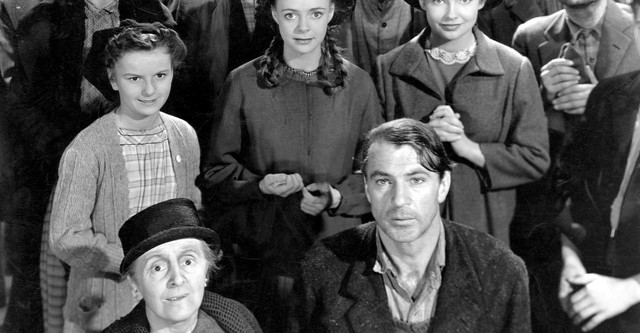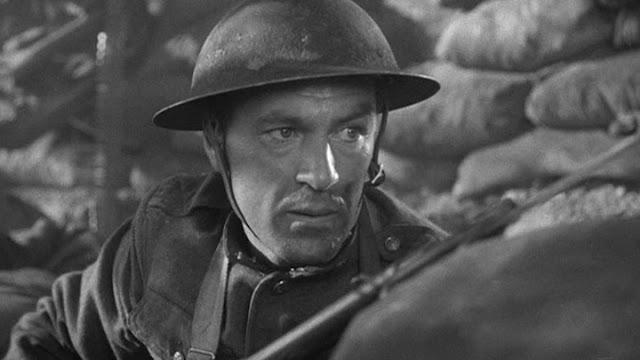Sergeant Alvin C. York was one of the most decorated American soldiers of World War I. York served during the United States-led portion of the Meuse-Argonne offensive in France, which was intended to breach the Hindenburg line and force a German surrender. For his part in the offense, he earned decorations from several allied countries during the war, including France, Italy, and Montenegro. His heroics have become legendary and would have been well known to audiences in 1941. As time has marched on, though, that notoriety has diminished some, so it is of great worth to us all that a film like Sergeant York exists to remind us of the difference one man can make, not only on the battlefield but in life in general.
For a war film, Sergeant York doesn’t spend a whole lot of time at war. This was by the insistence of the real Alvin York, who was still very much alive at the time the film was in development. Alvin did not want a film to be made initially. He was persuaded to allow it in exchange for the production company funding the building of an Interdenominational Bible school. It was erroneously reported that York wrote to actor Gary Cooper, asking him to portray himself in the film. This rumor came from a letter that was sent to Cooper, forged with Alvin York’s name on it, a trick by the studio to entice the actor into the role.
Gary Cooper was a leading man by this point in his career but had appeared in war films going back into the 1920s, including the Oscar-winning film Wings. Gary would go on to win the Acting Oscar for Sergeant York. The real Alvin York’s insistence that the film focus mainly on the times leading up to the war aided in this Oscar win because it allowed Gary Cooper to show a wide range of character development that I will discuss in more detail in a bit. By spending so little time in the war, those going in expecting a real war film à la All Quiet on the Western Front may be disappointed at first. The payoff, though, is well worth the journey.
When we are first introduced to Alvin York (Gary Cooper), he is at a low point in his life. Living in rural Tennessee, he is well below the poverty line and isolated from the doings of the greater world outside his sphere. He spends his evenings drinking and fighting, living with his widowed mother, sister, and younger brother. Alvin sets his sights on two things: Gracie Williams (Joan Leslie), and a small plot of farmland, fertile ground he can work and build a better life for himself. While he does succeed in winning the heart of Gracie, the land he wants is sold out from underneath him at the last minute to another man, Zeke (Clem Bevans), whose only interest is getting back at Alvin because he, Zeke, also wanted Gracie. Drunken and upset over how things turned out, Alvin sets out during a storm to get even. But circumstances prevent him from going through it, and he finds himself drawn to the sound of a church choir led by Pastor Rosier Pile (Walter Brennan).
From that day forward, Alvin is a changed man. He goes to the two men who cheated him out of the land and makes amends with them, offering Zeke, who now owns the land, an opportunity to till it for him, eventually earning the rights to ownership from him. He also cleans up his life, putting away his former drinking and carousing ways. After a bit of time, though, word gets to him that the United States is requiring him to enlist in the army now that America is entering into the Great War. Alvin, with the help of Pastor Pile, applies for an exemption as a conscientious objector, but it is denied and he has to go to war. Through the course of things, Alvin York is shown by his superior officer that there are times when men must take up arms, even good Christians like himself. Alvin, who is a skilled marksman, quickly rises through the ranks where he will end his military career at the rank of Sergeant, highly decorated for his service in the war.
This is an amazing tale made all the more impressive by it being based on true events. However, like usual, this has been fictionalized a good bit so this film should motivate you to learn the real history rather than substitute for that history. That is not a slight against the film as it is custom in Hollywood to dramatize and exaggerate things. This kind of exaggerating of events even takes place amongst the narrative. After York, with the assistance of his fellow soldiers, captures a large company of German soldiers, word spreads of the event, growing more fanciful with each retelling until people are proclaiming that he has single-handedly killed the Kaiser himself. This kind of historical retelling is how myths are made and it’s no surprise that people come out of viewing this film believing everything they saw and heard.
Gary Cooper is absolutely convincing in all aspects of his character. While he himself is doing a tremendous job, the title and advertisements for this film betray the character’s arc enough to cause some problems in the film’s basic structure. It’s titled Sergeant York, which already tells you that he will not only end up in the army but will excel there. So when we are already an hour into the movie and nothing involving the war and the military has happened yet, it frustrates expectations. Likewise, after he finally does enter the service, we know he will not be a problem soldier, refusing to follow orders and fight when the time comes. The title and the imagery of Gary Cooper in uniform tell us all of that. Those of us who are not familiar with Alvin York’s history might believe that this story could be headed down a similar path as Hacksaw Ridge from 2016 where the protagonist demonstrates that it is possible to be a war hero without taking up arms against the enemy soldiers. This is not that kind of war movie, either, though.
The United States government only recognized a few religious groups when it came to conscientious objectors during World War I. Jehovah’s Witnesses, Christian Scientists, and groups like the Quakers and Amish could avoid service through this means. When it is first revealed of York’s feelings to the military leaders at army training, they assume they will have problems with him, including refusal to handle a weapon or take orders. Instead, what they find is a man who is mild-mannered but proficient and accurate with a rifle, something he grew up with in rural Tennessee, shooting turkeys. This skill translates well to military service, but when they offer him an opportunity to train other soldiers to shoot, he is reluctant to even be involved with killing on that level.
This leads to one of the most interesting scenes in the entire film. His sympathetic commanding officer gives him some passages of scripture to ponder over and offers him ten days of furlough at home to read over a volume of U.S. history before making a final decision, a decision they will support either way. Eventually, York finds the Biblical passage: render unto Caesar the things that are Caesar’s, and unto God the things that are God’s. This passage convinces him to accept the position and go to war.
Because this is a film from the 1940s, the brutal realism of war is downplayed heavily in favor of heroism and patriotism. This is not an anti-war movie by any means nor is it really trying to be. With so little of the film taking place on the battlefield, it could hardly be that, anyway. What a lot of people nowadays don’t remember is that the United States barely fought in the First World War. By the time U.S. troops were in Europe, there were only a handful of months left to the war. But those were a bad few months, leaving millions of Americans killed in the fight to defeat Germany. This reality, coupled with the real Alvin York’s insistence on the film’s focus being on his conversion and not the war itself, leaves the film a little too unbalanced overall. That being said, it works for this film and adds to its uniqueness.
This is a wonderful film that came out at a time when America had not yet entered World War II. It was still five months before the Japanese bombed Pearl Harbor and drove America into that war. But most people in the summer of 1941 already knew it was only a matter of time before we stepped in, and a film like this one brought with it a message about duty to God and your country and how those two things could be rectified. It promoted a way of thinking that helped some people who doubted their ability to fight for their country make that decision to go. There are times when we will be asked to raise arms in the fight for freedom and this movie does a good job of displaying that. It helps that it is on the back of one of the greatest actors of his time, Gary Cooper.
Academy Award Nominations:
Outstanding Motion Picture: Hal B. Wallis and Jesse L. Lasky
Best Director: Howard Hawks
Best Actor: Gary Cooper (won)
Best Supporting Actor: Walter Brennan
Best Supporting Actress: Margaret Wycherly
Best Original Screenplay: Harry Chandlee, Abe Finkel, John Huston, and Howard Koch
Best Art Direction - Interior Decoration - Black-and-White: John Hughes and Fred MacLean
Best Cinematography - Black-and-White: Sol Polito
Best Film Editing: William Holmes (won)
Best Scoring of a Dramatic Picture: Max Steiner
Best Sound Recording: Nathan Levinson
____________________________________________________
Release Date: July 2, 1941
Running Time: 134 Minutes
Not Rated
Starring: Gary Cooper, Walter Brennan, and Joan Leslie
Directed By: Howard Hawks










Comments
Post a Comment